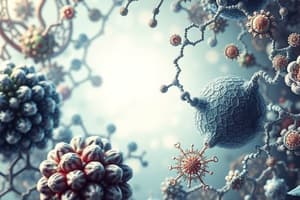Podcast
Questions and Answers
What type of macromolecule are enzymes?
What type of macromolecule are enzymes?
- Nucleic Acids
- Carbohydrates
- Proteins (correct)
- Lipids
What are enzymes?
What are enzymes?
Proteins that act as biological catalysts
What are catalysts?
What are catalysts?
A substance that increases the rate of chemical reaction
Enzymes speed up chemical reactions by lowering the ______.
Enzymes speed up chemical reactions by lowering the ______.
What do enzymes do to the activation energy?
What do enzymes do to the activation energy?
What do enzymes do in chemical reactions?
What do enzymes do in chemical reactions?
What is an enzyme-substrate complex?
What is an enzyme-substrate complex?
What is the energy needed for a reaction?
What is the energy needed for a reaction?
What two environmental conditions can affect the activity of an enzyme?
What two environmental conditions can affect the activity of an enzyme?
Which factors affect enzymatic reactions?
Which factors affect enzymatic reactions?
What is the optimal pH that this enzyme functions at?
What is the optimal pH that this enzyme functions at?
What is the optimal temperature that this enzyme functions at?
What is the optimal temperature that this enzyme functions at?
What happens when the pH is 2?
What happens when the pH is 2?
What is the optimal pH for intestinal protease?
What is the optimal pH for intestinal protease?
What is the optimal pH for gastric protease?
What is the optimal pH for gastric protease?
What enzyme works best in a very acidic environment?
What enzyme works best in a very acidic environment?
What is a monomer of protein?
What is a monomer of protein?
What are the elements of proteins?
What are the elements of proteins?
What are examples of protein in food?
What are examples of protein in food?
What are functions of proteins?
What are functions of proteins?
What is a monomer?
What is a monomer?
What are polymers?
What are polymers?
What are the denaturation and renaturation of a protein?
What are the denaturation and renaturation of a protein?
What is a nucleotide made up of?
What is a nucleotide made up of?
What are the different types of proteins?
What are the different types of proteins?
What is regulatory protein?
What is regulatory protein?
What is transport protein?
What is transport protein?
What is structural protein?
What is structural protein?
What is protective protein?
What is protective protein?
What are the elements of nucleic acids?
What are the elements of nucleic acids?
What are two types of nucleic acids?
What are two types of nucleic acids?
What is the function of nucleic acids?
What is the function of nucleic acids?
What do most enzymes end with?
What do most enzymes end with?
Flashcards are hidden until you start studying
Study Notes
Enzymes Overview
- Enzymes are proteins that serve as biological catalysts, speeding up chemical reactions.
- Catalysts increase the rate of chemical reactions without being consumed in the process.
- Enzymes lower the activation energy required for reactions to occur.
Enzyme-Substrate Complex
- Enzymes provide a specific site where reactants (substrates) can be brought together to facilitate reactions.
Environmental Impact on Enzymes
- Enzyme activity is affected by various factors including ionic conditions, pH values, substrate concentration, and temperature.
- Optimal pH for most enzymes is around 7.5, while specific enzymes have different optimal pH levels:
- Intestinal Protease: pH 9
- Gastric Protease: pH 3
- Optimal temperature for many enzymes, including those in human body, is 37 degrees Celsius.
- Extreme pH or temperature can lead to enzyme denaturation, altering their function.
Protein Basics
- Proteins are made of amino acids, which are their monomers.
- Key elements found in proteins include nitrogen, calcium, iron, and zinc.
- Common dietary sources of proteins include eggs, beans, milk, and cheese.
Functions of Proteins
- Proteins are essential for the function and support of body tissues and organs.
- Different types of proteins serve specific roles:
- Regulatory: Control reaction rates in the body.
- Transport: Distribute nutrients throughout the body.
- Structural: Form various parts of the body.
- Protective: Create structures that protect the body.
Nucleic Acids
- Nucleic acids, such as DNA and RNA, consist of elements: carbon, hydrogen, oxygen, nitrogen, and phosphorus.
- Their primary function is to store and transmit genetic information.
Protein and Enzyme Properties
- Most enzymes' names end with the suffix "ase," indicating their function.
- Denaturing factors for proteins include extreme temperature and pH changes.
Additional Concepts
- Polymers are large molecules formed by joining two or more monomers, while monomers are the smallest units of these large molecules.
- Nucleotides, the building blocks of nucleic acids, are composed of a five-carbon sugar, a phosphate group, and a nitrogenous base.
Studying That Suits You
Use AI to generate personalized quizzes and flashcards to suit your learning preferences.




